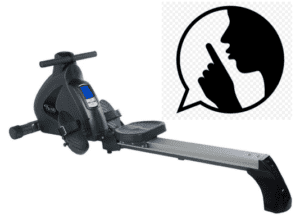
If so, this article breaks down the noise level of each resistance type.
Learn how the 4 resistance types differ from each other and which models are crowned “King” of silent rowing machines.
Compare the sounds produced by each rowing machine to help you decide which model is right for you!
You can also learn about other factors, like build quality, that effect rowing machine noise.
Finally, read what I feel is the most quiet rowing machine and how I think you should decide which model to buy!
Rowing Machine Resistance Types
When learning about rowing machine noise and trying to find the best quiet rowing machine, we must first analyze the different resistance types.
Resistance is the #1 creator of noise while rowing and accounts for at least 90% of the sound created.
Each resistance type creates a different noise based on the mechanism it uses to create the resistance.
Some will be virtually silent, while others produce enough noise to require TV volume to be increased.
Below I will explain how much rowing machine noise is created by each resistance type and which produces the most quiet rowing machine.
Air Rowing Machine Noise Level
Air rowing machines are notorious for being the chosen resistance type by Olympic Rowers but also being the noisiest.
They operate by utilizing a fan attached to the rowing handle. When the user pulls the handle, the fan begins to spin.
In order to spin, the fan must “move” the air in front of it, thus creating resistance. The faster you row, the faster the fan spins, and the more resistance is created.
However, the faster you row, the louder the fan flywheel becomes!
Here is a video of me rowing on my Concept2 Model D with and without the TV on. It will give you a good idea of air rowing machine noise levels.
Most people don’t mind the noise created by air rowing machine and say they can still watch TV as long as they turn the volume up.
The noise is also not loud enough to disturb a person in another room during the day but if you exercise early in the AM or late at night it could disturb someone sleeping.
I wrote an article fully detailing the noise created by a Concept2 Rower here, which is about the same noise created by all air rowing machines.
If you are looking for the quietest rowing machine, then an air rower is not the best option. However, I do feel it offers the best resistance (hence why it is used by Olympic Rowers).
Water Rowing Machine Noise Level
Water rowing machines operate almost exactly the same as air rowing machines but use “water” instead of “air” for resistance.
Like air rowers, a fan flywheel is attached to a rowing handle, except this time is is suspended in a tank of water.
As the user pulls the handle, the flywheel begins to spin. The flywheel must displace the water in front of it, which then causes the resistance. The faster the paddles (flywheel) spin, the more resistance is created.
The benefit of water resistance over air resistance is the noise is greatly reduced. Due to the paddles being enclosed in a poly-carbonate (strong plastic) tank, the water sound is “muffled”.
Below is a video of a water rowing machine in action.
The sound of water is also a lot more soothing than air and many people find it meditative.
Water rowing machines are not easily heard in another room and users will only have to turn the TV volume up a little (less than air rowers).
I would consider water rowing machines to make a “medium” amount of noise.
They are great rowing machines for people looking to have “variable” resistance (i.e. the faster you row, the more resistance you feel) without the noise of air rowers.
Hydraulic-Piston Rowing Machine Noise Level
Hydraulic-piston rowing machines have a unique design that is unlike any other resistance type.
These rowing machines utilize either 1 or 2 hydraulic pistons to control the resistance and 1 or 2 rowing handles to control the motion.
The hydraulic-pistons operate by compressing a liquid (oil) through a small valve inside the cylinder.
To vary the resistance, users can twist the adjustment knob to make the valve smaller or bigger, thus increasing or decreasing resistance.
Hydraulic-piston rowers make virtually no sound and can be considered a “silent rowing machine”. Below is a popular model in action (See 56 seconds into the video).
As you can hear, the hydraulic-pistons make virtually zero noise. The only noise that can be heard is the ball-bearing seat rollers.
While this is an excellent “quiet rowing machine” there are a few downsides which include:
- The hydraulic-pistons heating up after 5-10 minutes and losing some of their resistance.
- Lower build quality which leads to more part malfunctions.
- Hydraulic-pistons heat up and sometimes leak oil.
- Overtime the lower quality parts can begin to squeak and make noises.
- Manufacturer only recommends to use for 20 minutes a day.
While hydraulic-pistons rowers are considered quiet rowing machines, they do have their downsides.
These are excellent rowing machines for people who are just looking to move more during the day and exercise for 15-20 minutes. They are perfect for using while watching TV.
If you want more of an intense rowing session, I do not recommend this resistance type.
Magnetic Rowing Machine Noise Level
Magnetic resistance rowing machines, as you may have guessed, use magnets to control their resistance.
This type is also a very quiet rowing machine and is considered a “silent rowing machine”. They make virtually no noise while operating.
The magnetic resistance operates by moving a magnetic closer or farther from a metal flywheel. The closer the magnet is to the flywheel, the more resistance the user feels.
There is no friction anywhere in the resistance mechanism, so there is no noise. The resistance is generated by the magnetic eddy currents interacting with each other.
I’m no physics expert, so here is a video that demonstrates magnetic resistance. This video demonstrates resistance controlled by a manual adjustment knob but you can also have a monitor that controls it electronically.
Due to the higher quality components and better build quality of magnetic rowing machines, they are a better option than hydraulic-piston rowers.
It was difficult to find a video of a magnetic rowing machine in-use where someone wasn’t constantly talking or with music playing in the background.
This video is a good example on just how quiet a magnetic rowing machine operates.
You can only hear the rowing machine strap and a bit of the seat rollers. Plus, the person is wearing a microphone right next to the rowing machine, which is actually amplifying the sound.
I know this because I had the same problem when making videos with my air rower.
Overall, I feel magnetic rowers are the most quiet rowing machines.
This mainly has to do with the resistance making no noise and the other components making very little noise due to better build quality.
Below I list some other features that can cause rowing machine noise.
Other Rowing Machine Noise Factors
As I previously mentioned towards the beginning of this article, resistance accounts for 90% of the noise created by rowing machines. The other 10% is effected by the build quality.
Lower quality rowing machines will have cheaper parts that creak, squeak, rub, and make more noise.
If you are going to spend more than $500 on your rowing machine then you won’t have to worry as much about build quality. However, if you are looking into budget models you will.
Out of the quiet rowing machines (magnetic & hydraulic-piston), magnetic rowing machines offer better build quality at lower prices. This means they will be quieter.
Hydraulic-piston rowing machines tend to start out very quiet but overtime they can begin to “wear down” and create more noise.
Often times users complain about squeaking pistons, squeaking seats, and creaking joints. Users will usually have to apply grease to these parts to stop the noise but it is only a temporary fix.
This is why I recommend people buy magnetic rowing machines when looking at budget models.
Best Quiet Rowing Machine
If you haven’t guessed by now, it is my opinion that the best quiet rowing machine is a magnetic rower.
They offer the quietest resistance with the best build quality. They also offer excellent models in each price range so they are affordable for everyone.
If you want a more advanced magnetic rowing machine then I suggest the Stamina Avari Magnetic Rower. You can read my complete Stamina Avari Magentic Rowing Machine review here.
If you are interested in a budget magnetic rower, I suggest the Sunny Health & Fitness SF-RW5515 Magnetic Rower. You can read my full Sunny SF-RW5515 Magnetic Rower review here.
Both rowing machines offer excellent, silent magnetic resistance with good build quality. They are both very popular sellers with great reviews.
However, the “Best Quiet Rowing Machine For You” is going to be the resistance type you you like the best with the amount of noise you can tolerate.
If other rowing machine resistance types interest you, then you may find my comparison articles informative.
I wrote an article comparing air vs. magnetic resistance types that can help you decide between the two types.
I also wrote an article comparing water vs. air rowing machines to help people decide between the two.
Both articles should give you a good overview as to how the rowing machines will sound and operate compared to each other.
Final Thoughts
Judging the best quiet rowing machine model can be very difficult. Mainly due to everyone having different preferences when it comes to noise.
For example, some people may just want a “quiet rowing machine” where they can watch TV while rowing. In this case, any rowing machine will be fine!
A person then may be happiest with the Concept2 Model D Air Rowing Machine. The #1 bestselling rowing machine and the best resistance in my opinion.
Other people may want variable resistance (air or water) that won’t wake a person sleeping in the next room. In this case, I would recommend a WaterRower like the WaterRower Natural Rowing Machine.
Judging how quiet a rowing machine operates is obviously a bit of a personal preference but hopefully this article gives you a good idea of how noisy each resistance type sounds.
If I had to list rowing machine noise by resistance type, I would rate them as follows:
- Magnetic (Most Quiet)
- Hydraulic-Piston
- Water
- Air (Loudest)
I hope you enjoyed my article on the best quiet rowing machine! If you have an opinion on which model or resistance type is the best, please leave a comment below!

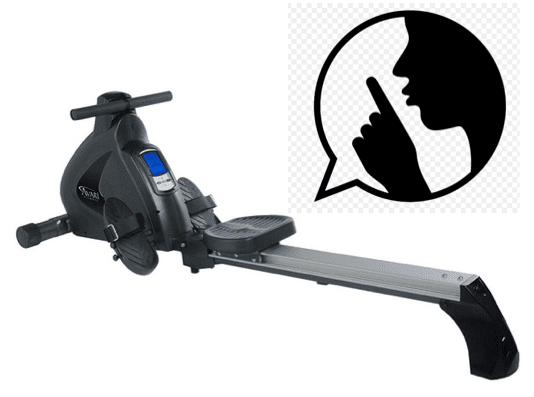
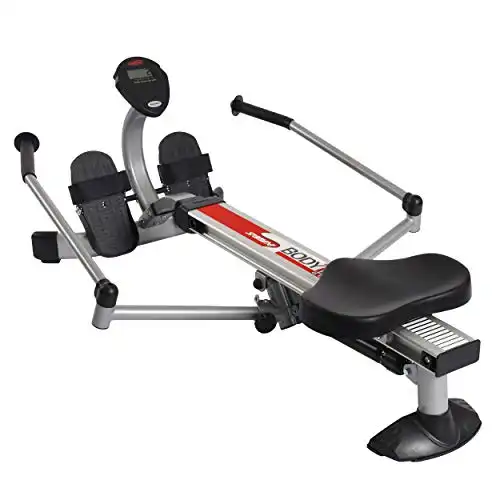
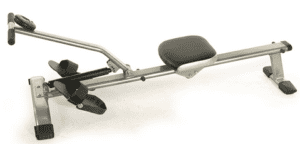
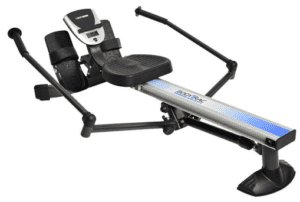

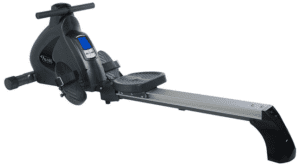
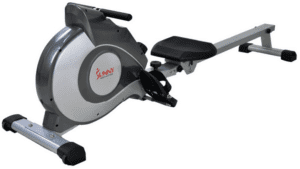
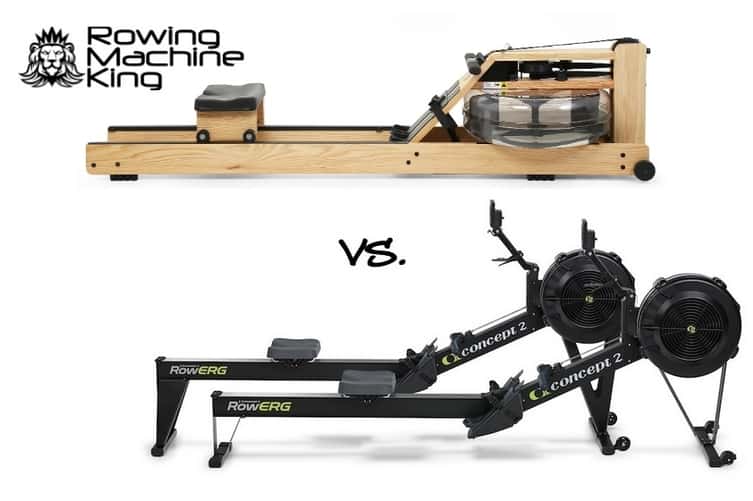
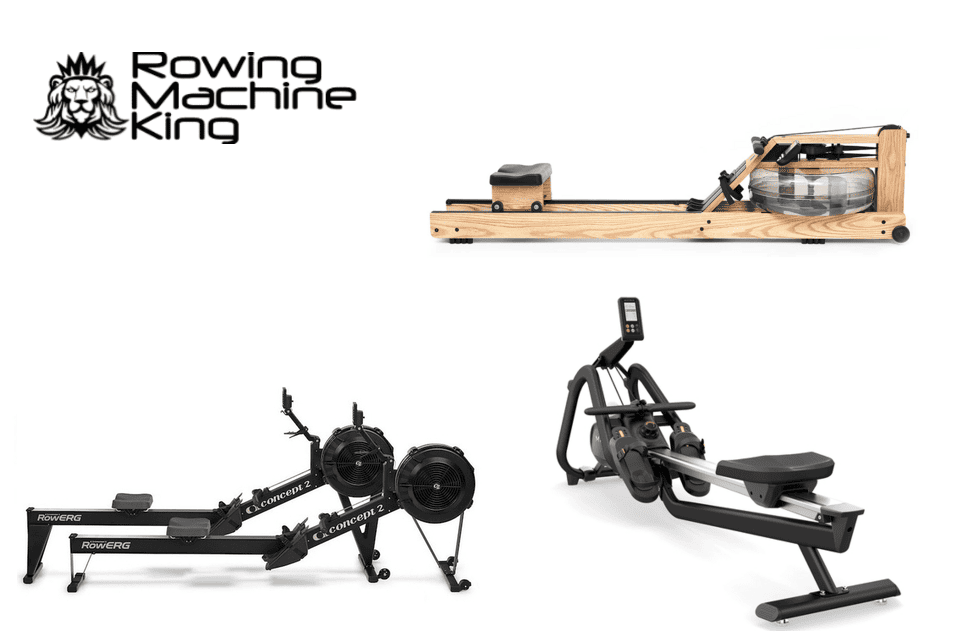
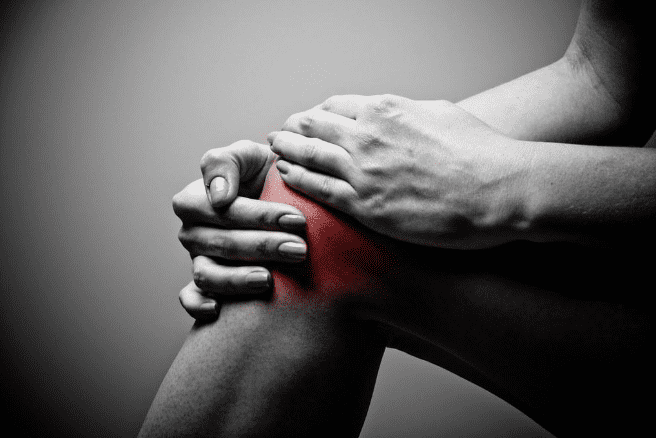
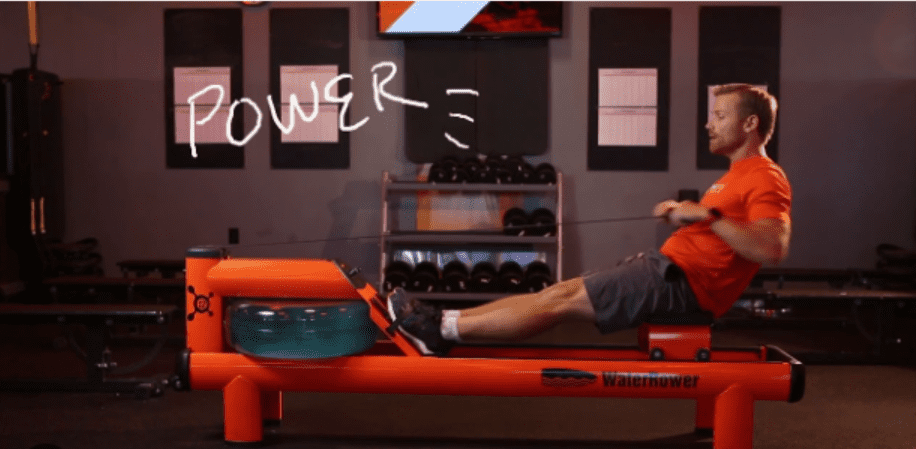
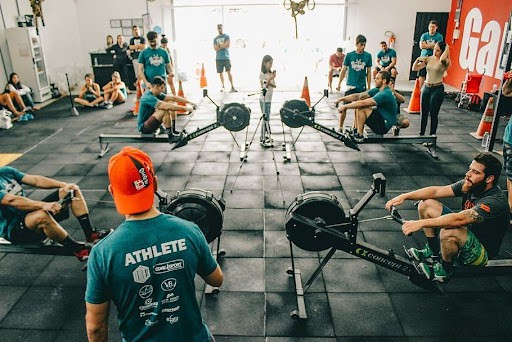
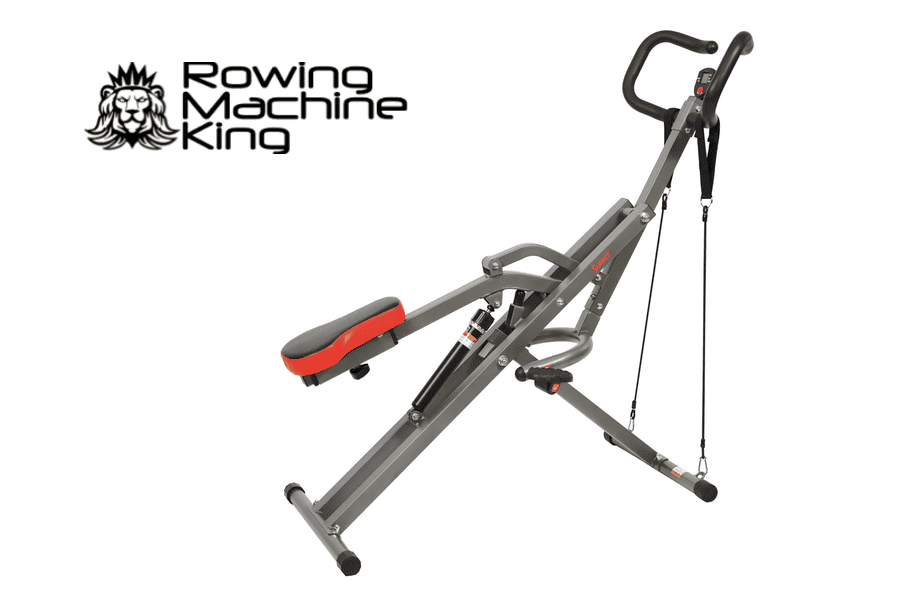
Hi,
Love your reviews!!! I am rehabbing a spinal situation and must avoid hyperextension on the back stroke at all cost. I love the Concept 2 at the gym but it is too noisy for home. Do you think the Avari magnetic resonance machine you reviewed here will be neutral, positive, or negative in helping me protect my lower back from hyperextension?
Thanks,
Kat
Hi Katharina,
Thank you for the compliment! I feel the Stamina Avari is going to have the same effect on your back as the Concept2. Luckily you have experience rowing so you can adjust the resistance on the Stamina Avari to match the resistance you are familiar with on the Concept2.
The major difference between the two models is going to be “variable” vs. “adjustable” resistance. You can read more about it in my air vs. magnetic rower article.
I think you will just have to find that “sweet” spot where the resistance isn’t to heavy or light for your back.
Best of luck and let me know if you need anything else.
Thanks for your answer! My question is more about the angle of sitting, whether it encourages or discourages hyper extension of the back when rowing. I must avoid hyper extension at all cost. Some machines encourage forward leaning,some backward leaning. Do you have any idea about that?
Thanks!
Hi Kat,
Sorry, I am not familiar with what you a referring to. Do you have examples of rowing machines that encourage or discourage hyper extension of the back?
The rowing motion/stroke is almost the same on all rowing machines. Maybe I am misunderstanding you and a few examples will help me.
Always glad to help :)
Hey!
First of all, great website, your reviews are fantastic.
Basically, I live in a third floor flat (apartment) in the UK. I love my rowing, and I work a busy job, so I’m looking to buy a rowing machine to maintain my fitness from home. Naturally, I’m concerned about the amount of noise that this will generate for those living below me. I’m thinking of going for a magnetic rowing machine (As you mention in this fantastic and very informative article here), but do you have any hints/tips for how to dull/dampen down the noise for those below? For example, putting mats underneath the rowing machine? I thought about putting folded towels/linen underneath to dampen the noise slightly.
Anyway, thanks in advance for any help that you can provide, and keep up the good work on the website!
Hi Andy,
Thank you for the kind words! I’m glad you like the site!
There isn’t a whole lot you can do about the noise but there are a few tricks like putting down a floor mat.
I actually go over some noise reduction tips in my C2 Noise Level article. Just scroll down about half way and you’ll see “Reduction Advice”.
Hope this helps a little. I’m sure you’ll be fine with a magnetic rower in an apartment!
This is just what I was looking for!!! Thank you for such a great review :)
You’re welcome John! I’m glad you found it useful! Thanks for the kind words.
I wish all product type comparisons were as clear and thorough as yours is. Thank you for alerting us to the downsides of each type of rower. I had no thought that hydraulic ones would heat up.
Thank you for the kind words Scott! I’m glad you found the post helpful
Cristal clear. Many thanks!
Thuy Dao